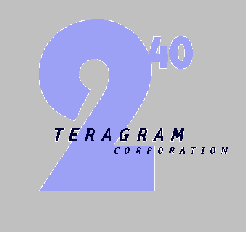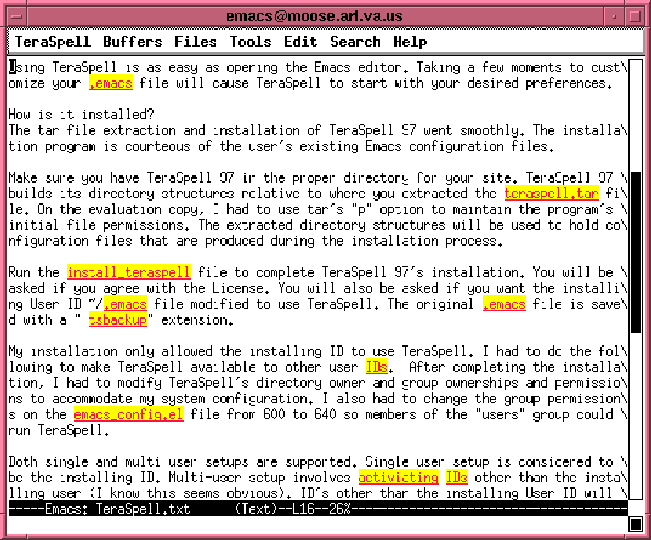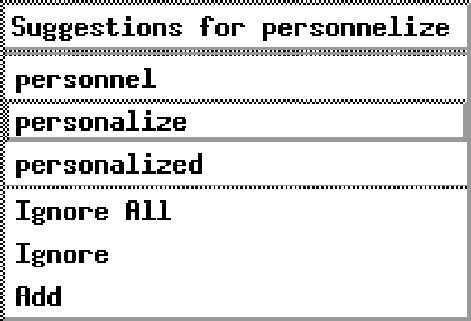

 |
 |

TeraSpell 97 for Emacs is a shareware version of the Teragram Corporation's Teragram Spell 97 for Windows, Mac and Unix. Naturally there are some differences between the shareware and the full product. TeraSpell for Emacs provides the Emacs user with a flexible multi-language tool for spell checking documents. As a test, I decided to use TeraSpell 97 and Emacs to write this review.
TeraSpell is used to spell check a word, line, region or buffer within Emacs. The evaluation copy contained only an American English spelling dictionary. Several other languages including British English, French and Canadian French, Dutch, German, Italian and Spanish were listed as possible language dictionaries. This software also allows users to define multiple custom dictionaries of their own.
The feature I like most is the phonetic spell checking. Spelling is not one of my fortes. Often I will spell a word the same way I pronounce it. Needless to say, my pronunciation of the word is not always correct, and hence neither is my spelling. TeraSpell did an excellent job of offering suggestions for my often abused spellings.
Using TeraSpell is as easy as opening the Emacs editor. TeraSpell appears as the left-most item on the Emacs menu. TeraSpell menu options include spell checking a region, buffer or word and spell checking words on the fly. You may also alter several default settings. Preferences that may be adjusted include the default dictionary, the foreground and background color used to highlight misspelled words, the underlining of misspelled words and the placement of the suggested spelling's floating menu.
There are two ways to set individual preferences. One is to start Emacs and make selections from the TeraSpell Menu. The menu method lasts only for the duration of the Emacs session. The other is to customize your ~/.emacs file which will cause TeraSpell to start with your desired preferences. Changes to the ~/.emacs file involve appending setq variable definitions to the bottom of the ~/.emacs file.
I configured TeraSpell to display misspelled words in red with a yellow background (see Figure 1). To correct a misspelled word you place the mouse cursor over the word and click the right mouse button. This right click action displays a pop-up menu with some suggested spellings or alternate words (see Figure 2). I noticed an odd cursor behavior when correcting misspelled words. The cursor seems to act as an insertion point when it is within a misspelled word. Instead of replacing the misspelled word, the new word was inserted into the misspelled word.


TeraSpell came as a gzipped tar file. The tar file extraction and installation of TeraSpell 97 went smoothly. The installation program was courteous of my existing Emacs configuration file.
Make sure you have TeraSpell 97 in the proper directory for your site. TeraSpell 97 builds its directory structures relative to where you extract the teraspell.tar file. On the evaluation copy, I used tar's p option to maintain the program's initial file permissions. The extracted directory structures are used to hold configuration files produced during the installation process.
Next I ran the install_teraspell program to complete TeraSpell 97's installation. I was then asked if I agreed with the License and if I wanted the ~./emacs file of the installing UID modified to use TeraSpell. The modification is a line that starts TeraSpell. The startup line is appended to the ~/.emacs file and the original ~/.emacs file is saved with a -tsbackup extension.
Both single- and multi-user setups are supported. Single-user setup is considered to be the installing UID. Multi-user setup involves activating UIDs other than the installing user (I know this seems obvious). UIDs other than the installing UID will have to run a program called ts_adduser or manually modify their ~/.emacs files to load TeraSpell with Emacs.
My installation only allowed the installing UID to use TeraSpell. To make TeraSpell available to other users, I had to modify TeraSpell's directory group owner and some group permissions to accommodate my system configuration. I also had to change the group permissions on the emacs_config.el file from 600 to 640, so members of the users' group could run TeraSpell.
Product Requirements Documentation for the reviewed copy of TeraSpell indicated it runs on Linux, HP-UX, IRIX, Sun4 and Sun5. I did not see a minimum required version of Emacs in the documentation. I did notice the installation process verifies that an Emacs release 19.29.1 or newer is installed.
The Teragram Corporation provides advanced text processing tools and linguistic resources to manufacturers, developers and researchers for inclusion in their applications. Teragram may be reached at: Teragram Corporation, 236 Huntington Avenue, Boston, MA 02115-4701, 617-369-0100 (voice).
The platform used to review this product was an Intel 486/66 with 20MB RAM and a 16MB swap file. This platform is running the Slackware96 distribution of Linux with a 2.0.30 kernel and XF86Free V3.1.2 with the FVWM window manager. Emacs version 19.31.1 provided the Emacs editor environment.
Daniel Lazenby holds a BS in Decision Sciences. Daniel has been working with specialized and general purpose computer systems for more than 20 years. He first encountered Unix in 1983 and discovered Linux in 1994. Today he provides Engineering Support for a wide range of platforms running Linux, AIX and HP-UX. His e-mail address is lazenby@ix.netcom.com.